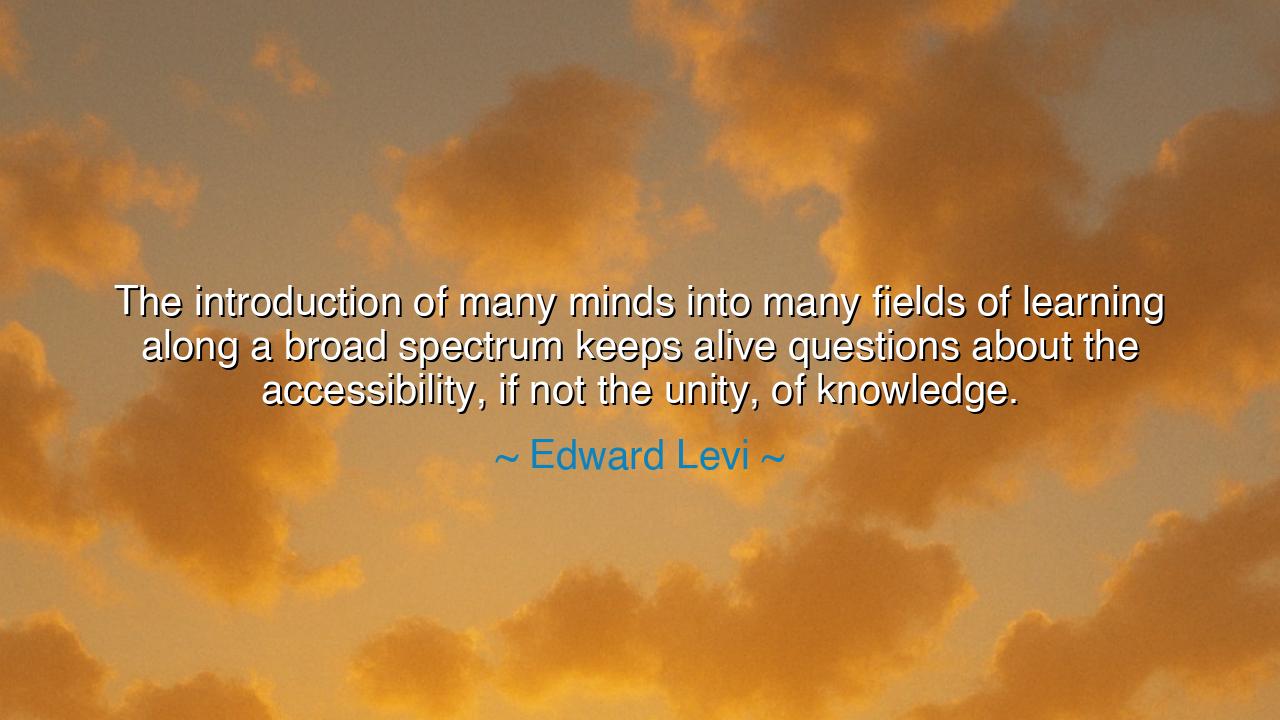
The introduction of many minds into many fields of learning along
The introduction of many minds into many fields of learning along a broad spectrum keeps alive questions about the accessibility, if not the unity, of knowledge.






The jurist and scholar Edward Levi, a man of law and learning, once wrote these luminous words: “The introduction of many minds into many fields of learning along a broad spectrum keeps alive questions about the accessibility, if not the unity, of knowledge.” In this reflection, he speaks as both philosopher and teacher, reminding us that knowledge is not the possession of one, nor the dominion of the few, but a living flame that burns brighter when many minds attend to it. For when the seekers are many and their paths diverse, the light of understanding grows wide enough to illuminate truths that no single intellect could contain.
Levi, who served as the President of the University of Chicago and later as the Attorney General of the United States, lived at the crossroads of law, philosophy, and education. He witnessed the struggle between specialization and breadth—the narrowing of disciplines into isolated towers of thought. His quote arises from his belief that true wisdom does not dwell in confinement. He saw that the more scholars and thinkers explore across fields—science, art, law, philosophy, and beyond—the more humanity questions not only what it knows, but how all knowledge connects. For every discipline, when opened to the curiosity of others, becomes a bridge rather than a barrier.
When Levi speaks of “many minds in many fields,” he calls upon the spirit of intellectual communion—the meeting of diverse perspectives that breathes life into civilization itself. He warns against the danger of separation, when the scientist forgets the poet, when the philosopher ignores the engineer, when the lawyer ceases to listen to the historian. Such division breeds arrogance and blindness, for the universe itself is one, though we divide it into parts. The unity of knowledge, as Levi reminds us, is not lost; it is only obscured by our failure to look beyond the walls of our chosen domains.
This wisdom echoes the spirit of the Renaissance, that age when human curiosity dared to embrace the whole of creation. Consider Leonardo da Vinci, the painter who was also an engineer, anatomist, and dreamer of flight. In him, the many threads of learning were woven into a single vision of truth. His art drew from science, his science from observation, and his imagination from the heart of humanity itself. Leonardo embodied what Levi proclaimed—that when many minds enter many fields, questions are not extinguished but awakened. The boundaries of knowledge are tested, and in that testing, the wholeness of truth becomes visible again.
Levi’s words also speak to our modern age, where the flood of information tempts us to isolation within our expertise. We live in an era of vast databases and narrow minds, where the physician may know the human cell but not the human soul, and the economist may measure wealth but not well-being. Yet Levi’s call resounds across the years: to restore dialogue among disciplines, to let the physicist speak with the philosopher, the artist with the mathematician, the scientist with the theologian. For it is only through many perspectives that we approach the mystery of truth, and only through humility that we see how each piece belongs to the same great whole.
O seeker of wisdom, learn this: to know truly is to see connections. Do not be content with mastery of one craft alone. Read beyond your trade, think beyond your comfort, and listen to the voices of other disciplines. For the mind that remains open to the vast landscape of learning keeps alive the most sacred of human powers—the ability to wonder. And wonder, as the ancients knew, is the seed from which all wisdom grows.
Thus, Levi’s teaching becomes both a challenge and an invitation. The challenge is to reject the arrogance of the specialist who claims ownership of truth; the invitation is to join the eternal conversation of the many minds who seek to weave their insights into a larger tapestry. Knowledge is not a castle with locked gates, but a garden that thrives when many hands tend it. The questions that rise from this garden—about the accessibility and unity of knowledge—are not signs of confusion, but signs of life.
So let us walk, each with our own lantern, into the vast and varied fields of understanding. Let us learn from one another, question one another, and build together the house of wisdom that no single generation, no single mind, can complete. For as Edward Levi taught, the future of knowledge lies not in the walls we build between disciplines, but in the bridges we build between souls. And when many minds labor together in the service of truth, then—perhaps—the unity of all knowledge, once glimpsed by the ancients, may yet be revealed anew.






AAdministratorAdministrator
Welcome, honored guests. Please leave a comment, we will respond soon